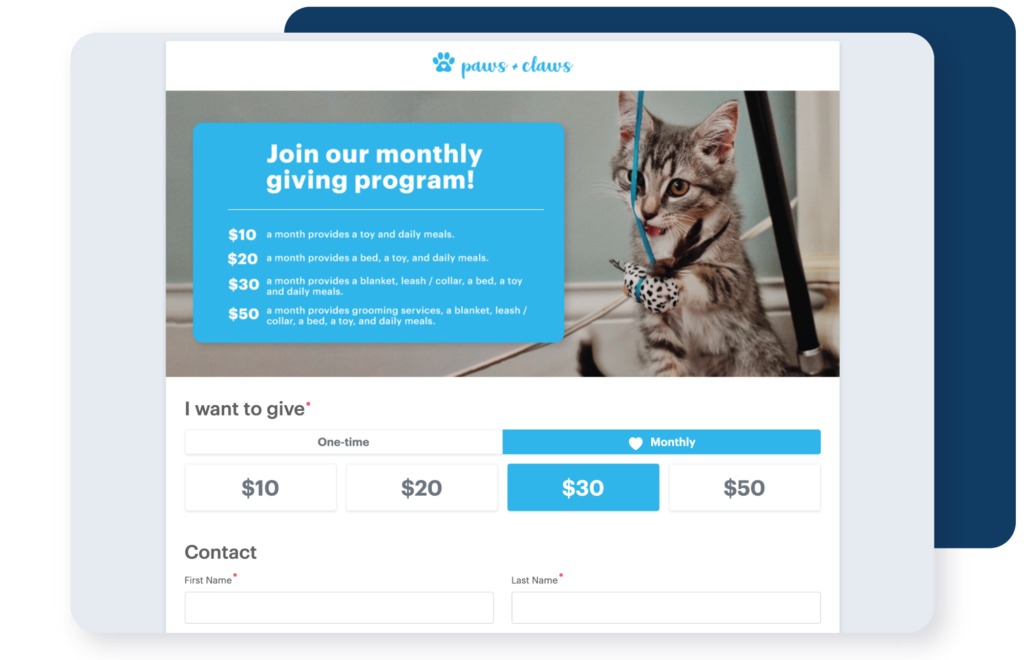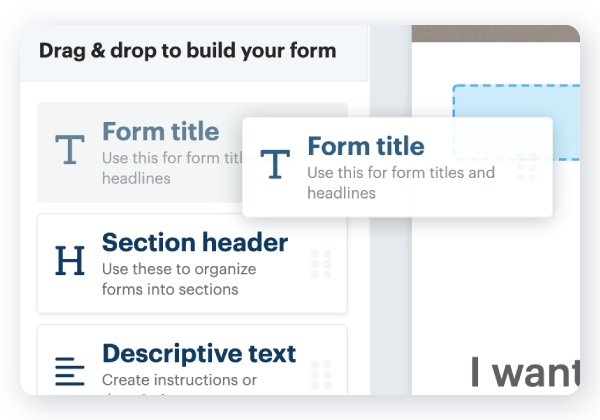With 50% of nonprofits receiving the majority of their donations from Giving Tuesday through December 31, it’s imperative to make the most of the giving season to boost visibility and bring in end-of-year donations. Providing a range of giving options can oftentimes result in higher donations, but determining the right ask amounts is key.
You can strategically calculate appropriate ask amounts for online and direct mail solicitations through a data-driven approach to maximize your fundraising efforts.
Why giving amounts matter
Some nonprofits don’t give much thought to ask amounts or giving tiers when crafting their solicitation letters or setting up online donation forms, oftentimes using the same amounts year after year. But, well-planned giving amounts are critical to helping supporters determine how much they can donate. Most donors will appreciate the guidance and usually end up giving more when offered a range.
Pro tip: Provide donors with 4-6 ask amounts, with one of them being “other.” This allows your donors to easily select the option that’s right for them yet doesn’t overwhelm them.
How to determine ask amounts
Take a look at your data as you go about choosing the giving levels for your campaign and maximize your donors’ giving potential. You can use your donor management system’s built-in reports to assist with necessary data points and calculations. There are a number of ways to select giving amounts that leverage data and donors’ habits for both online and direct mail solicitations.
Online
With Giving Tuesday’s ongoing growth, it’s safe to assume that both your previous and potential new supporters are eager to contribute. Given the movement’s strong presence on social media, it is crucial to provide an online donation form for seamless engagement.
1. Build upon your average gift
Find the average gift made to your nonprofit from Giving Tuesday through the end of the year. Add up the total amount of contributions received during this timeframe and divide it by the total number of gifts received during the same timeframe. For example, if you received $30,000 in donations from Giving Tuesday through December 31 from 275 supporters, divide $30,000 by 275 to get an average gift of $109.
Donors tend to select an amount in the middle when provided options, so set one just above your average gift. Keeping our example, if your average gift was $109, you could list $100, $125, $200, and “other.”
Pro tip: Use the same method to determine giving amounts for your general donation form used the rest of the year with data from January up to Giving Tuesday.
2. Utilize impact statements
Include impact statements or donation descriptions next to your ask amounts on your donation form so your donors know how their gift can positively impact the community. For instance, illustrate how $100 can buy five collars for therapy dogs, while a $500 gift can cover necessary obedience training.
For example, DonorPerfect Online Forms allow you to add your own ask amounts and descriptions (including monthly options) to easily explain and maximize impact!

3. Encourage monthly giving
Incorporate suggested monthly giving amounts in your online forms as a powerful strategy to increase engagement year-round. For recurring donations, our data shows that around $50 is the most successful suggested giving level, and since most people select a middle option, your monthly giving tier could be $25, $50, and other.
Psychologists who specialize in understanding consumer behavior have uncovered that numbers ending in 4, 7, and 9 are perceived as more affordable on an ongoing basis as compared to those ending in 0 or 5. Try introducing giving tiers that align with this theory, effectively motivating donors to commit to recurring contributions. For instance, if your average gift amount is $109, consider suggesting giving amounts of $119, $149, and $199 to foster a sense of affordability and encourage more monthly giving.
Pro tip: Put this theory to the test! Your online form tool should allow you to list different giving amounts for one-time and monthly gifts on the same donation form.
Direct mail
Delve deeper into each donor’s giving history to provide tailored ask amounts that resonate with their interests and past contributions.
1. Take high gifts to new levels
Maximize your donors’ potential by asking for 20% more than their previous highest gift amount. Use your constituent relationship management system (CRM) to find this data point and multiply each donor’s previous maximum gift by 1.2 (120%) to determine the new ask amount. For example, if they previously gave a maximum gift of $200, multiply that by 1.2 to get $240 as the target.
2. Leverage last gift amount
Again using the reports in your CRM, determine the last gift given by each donor. Provide giving tiers of last gift, last gift +10%, last gift +20%, and “other.”
Continue making data-driven decisions
Evaluate your current data partway through your end-of-year campaign. You may want to change up your ask amounts – that’s one of the many benefits of online donation forms. If most people are giving a select amount, slightly increase that option. If, for instance, you offered $100, $125, and $250, and people are frequently giving $100 and $125, increase your second ask amount to $150 and see if the trend continues.
Pro tip: Use your CRM’s scheduled reports feature to have this data delivered right to your inbox at regular intervals, so you can quickly evaluate and determine if you need to adjust your giving levels.
DonorPerfect clients: If you’re ready to take your fundraising to the next level, our expert trainers will help you identify patterns and trends in your data so you can optimize your messaging, target the right donors, and ultimately raise more funds for your cause.
Don’t yet use DonorPerfect? Get started today to increase your donations this Giving Tuesday.

Increase the effectiveness of your donation form
Customize your online donation form to connect with donors on a personal level and enhance their giving experience. A thoughtful, visually appealing, and well-branded form can make a significant difference in donor engagement and contributions to your cause.
Form effectiveness checklist:
- Incorporate your organization’s branding elements such as colors, fonts, and images, to foster recognition and donor comfort.
- Make your donation form easy to find on your website in case people prefer to go directly there or find your organization organically.
- Verify that your form link for email and social media posts is properly functioning.
- Ensure user-friendliness across various devices.
- Include suggested donation amounts with impact statements to connect donors to your mission.
- Pre-select a default amount to nudge donors to consider giving an amount similar to what others contribute.
- Offer monthly-giving.
- Include your organization’s contact information in the form’s footer to build donor confidence and recognition.
Raise more money for your organization with integrated DonorPerfect Online Forms. Perfectly customize them to meet your nonprofit’s needs.

To make the most of this global giving movement, determine ask amounts through a thoughtful and data-driven approach. Aligning your giving tier with the generosity that surrounds the day will help drive meaningful support for your organization’s mission on Giving Tuesday and beyond. Want to discover more ways to grow your giving? Get your free Giving Tuesday Cheat Sheet – available for download below.








Follow us on social!